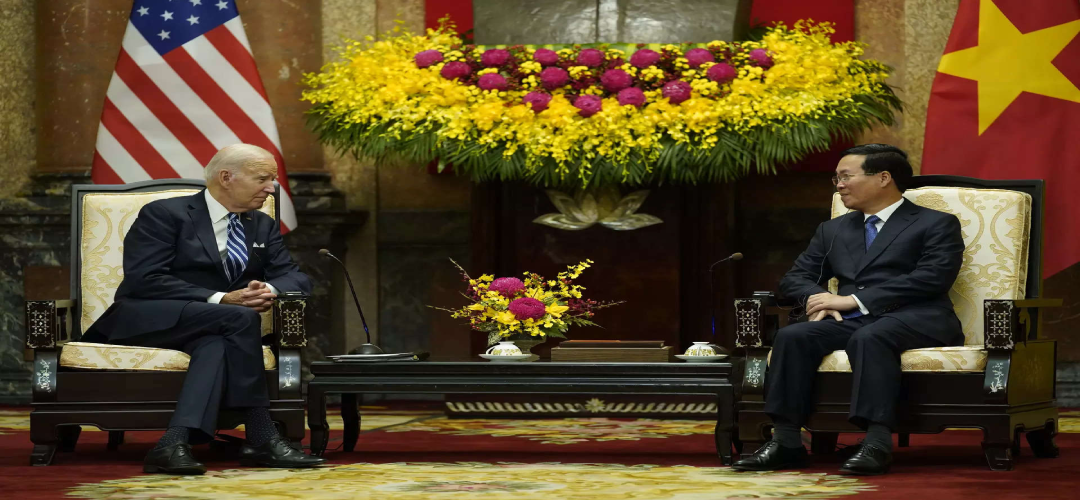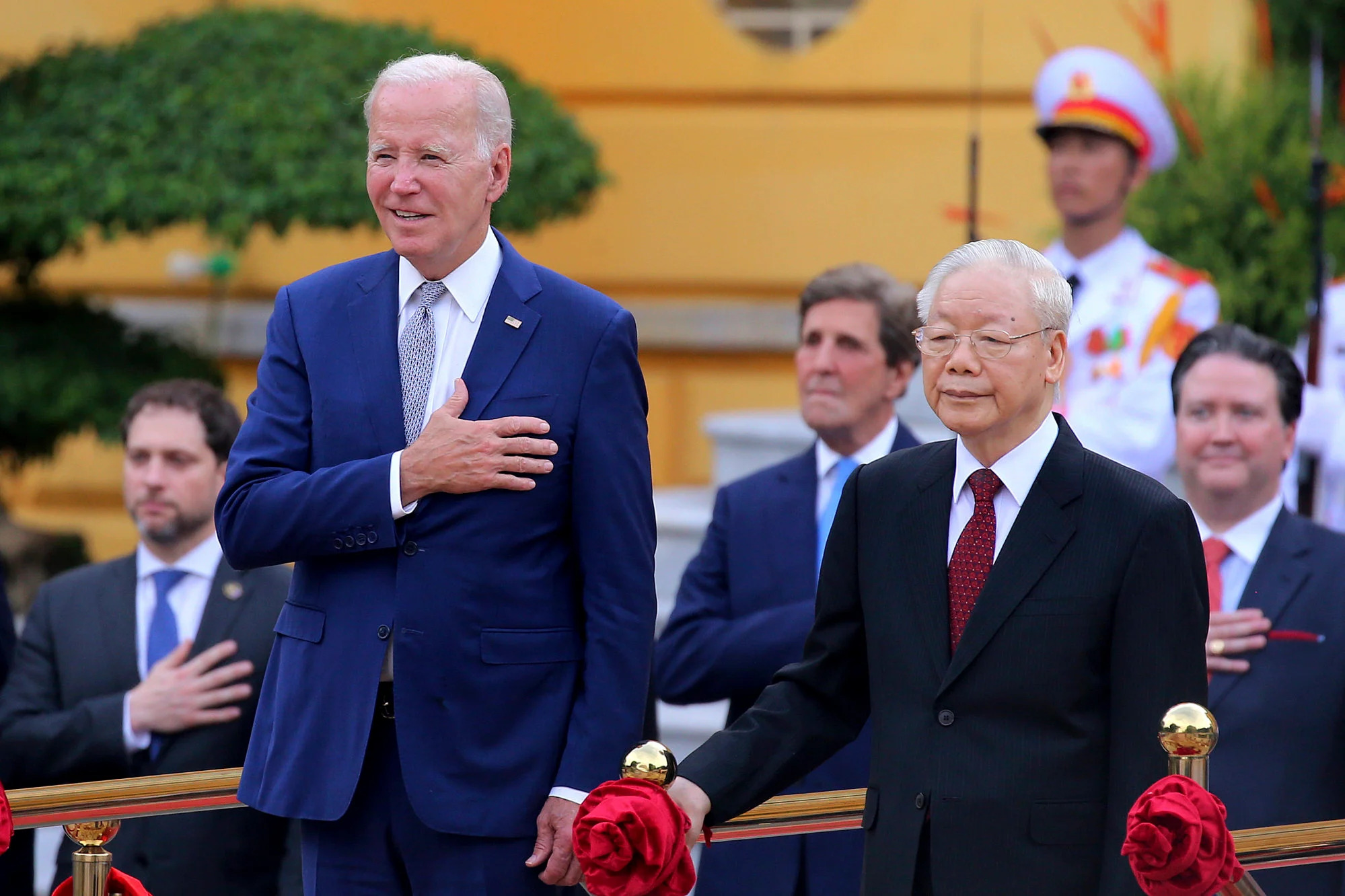Old Foes, New Allies
September 16, 2023 | Expert Insights

President Joe Biden is the first U.S. president to visit Vietnam in 25 years. The visit underscores Washington’s search for partners and allies in the Indo-Pacific in the face of China's growing assertiveness.
Background
The nearly two-decade Vietnam War is perhaps the best-recorded conflict of modern times. Pentagon gave the electronic media unlimited access to the battlefield (a fact rued later and never repeated), streaming into millions of drawing rooms at prime time the images of a brutal war every evening. That it was a strategic defeat for the mighty superpower at the hands of stumpy rice-eating peasants derogatorily called 'gooks' by the half-a-million-strong American army with the best technology at its disposal is a national trauma that even the glorious victories in the Gulf have not been able to completely erase from the collective consciousness of the American psyche.
Therefore, it is even more surprising that since 1975, both parties have strenuously worked at putting away the hatred and the recriminations of the past and tried to mend fences. Almost two decades after the fall of Saigon and the inglorious heli-lift from the American Embassy watched by the whole world, the erstwhile adversaries normalised diplomatic relations followed by closer partnership in trade, investment, and security.
The Biden administration is keen to build on this progress. In a joint statement issued after Biden's meeting with Vietnamese Prime Minister Pham Minh Chinh, the two countries pledged to "deepen their strategic partnership" and to "work together to address shared challenges, including climate change, the COVID-19 pandemic, and the South China Sea."

Analysis
In recent years, Vietnam has become increasingly concerned about China's growing military presence in the South China Sea. The U.S. has also expressed concerns about China's assertive behaviour in the region, and the two countries have been working together to counter China's influence. The visit is also seen as a way for the U.S. to signal its commitment to the Indo-Pacific region and to counter China's growing influence.
While the simplistic view of the visit is that it is directed at China, the truth is more complex. Just like India, which, despite the growing tensions in the Northern Frontiers, saw its trade with China booming in favour of the latter, Vietnam also finds itself in a somewhat similar predicament. Having slugged out a largely inconclusive short but bitter war in 1979, economic compulsions have overtaken the historical animosity. While both sides may see their naval ships jostling for space in the disputed South China Seas, Beijing is Vietnam's largest trading partner. Hanoi's economic renaissance in the last two decades is closely linked to the gigantic Chinese economy.
The U.S. is the leading proponent of freedom of navigation in international waters, and whether it is the South China Sea or the areas claimed as its EEZ by India in the Bay of Bengal, American Carrier Groups sail through them with impudence showing the flag. This is what the U.S. Navy has been doing for years in the South China Sea, and now it wants to bring in littoral countries into the game on its side. While traditional allies like Thailand, Malaysia, Philippines, etc., have always been under the larger security umbrella of the United States, Washington would like to extend this partnership to other countries in the region, and Hanoi is a prime target.
This is likely to be seen as a challenge by China and could lead to increased tensions with Vietnam. Vietnam has overlapping claims in the South China Sea and has been one of the most vocal critics of China's behaviour in the region.
The long-term implications of Biden's visit to Vietnam for China are unclear. However, the visit will likely contribute to the growing US-Vietnam ties and strengthening the US-led alliance in the Indo-Pacific region. This could make it more difficult for China to achieve its regional goals, leading to increased tensions between China and the U.S.
Apart from geopolitics, there is a strong economic factor also. Vietnam has the world's second-biggest estimated deposits of rare earths used in electric vehicles and wind turbines. The meeting underscored the U.S. desire to boost Vietnam's global role. This is particularly so in chipmaking, with Washington seeking to reduce the sector's exposure to China-linked risks, including trade friction and tensions over Taiwan.
India View
India's strategic outreach to Vietnam, including the proposed sale of Brahmos missiles and the recent gifting of the in-service missile corvette INS Kirpan to Vietnam, reflects the growing strategic partnership between the two sides, especially in the maritime domain. Washington's positive overture to Hanoi at the apex level would be greatly welcomed in security circles in New Delhi.
Assessment
- Vietnam is a strategically important country in the Indo-Pacific region. It is located on the South China Sea, a vital international trade shipping lane. Vietnam is also a member of the Association of Southeast Asian Nations (ASEAN), an increasingly important regional organisation in the face of China's growing influence. Only time will tell how the long-term implications of Biden's visit to Vietnam will play out for China. However, the visit is a sign of China's growing challenges in the Indo-Pacific region.
- The United States and Vietnam have already been cooperating on security issues, such as maritime security and counterterrorism. The Biden administration's visit to Vietnam could lead to even closer cooperation on these issues. The United States could also provide Vietnam with military assistance, such as ships and aircraft, to help Vietnam defend its sovereignty in the South China Sea.
- China has been trying to isolate Vietnam in the region by pressuring other countries not to cooperate with Vietnam. The Biden administration's visit to Vietnam sends a message to other countries that the United States supports Vietnam and that they should not be afraid to cooperate with Vietnam.








Comments